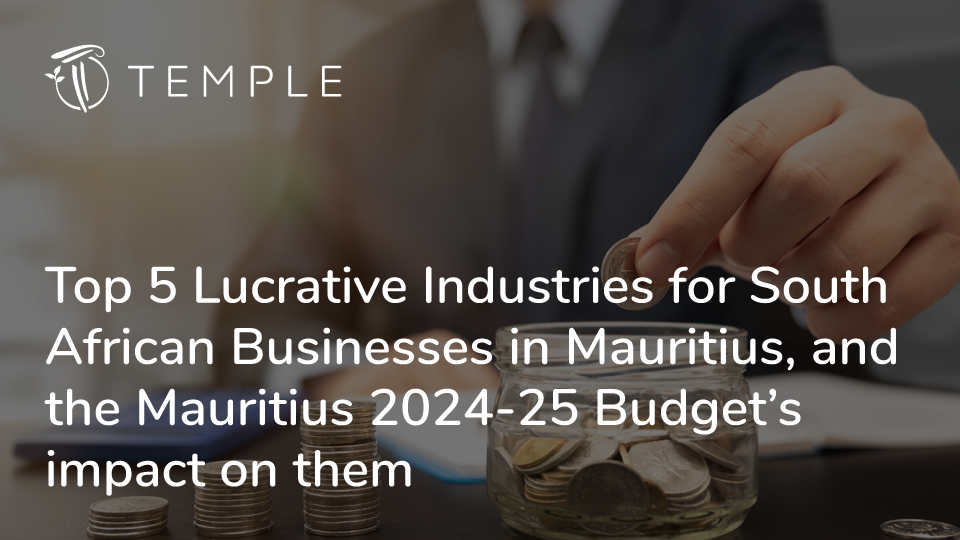Dreamt of pristine beaches lapping at your toes while your business thrives under a light tax burden? Look no further than Mauritius, the gem of the Indian Ocean. This island paradise offers South African investors the perfect blend of opportunity and ease. Imagine, building a flourishing business under a regime designed to empower its ventures, all while knowing your family is safe in a politically stable and stunningly beautiful environment. Mauritius beckons, promising a life enriched by both financial rewards and an idyllic island lifestyle. Let’s explore how this tropical haven can be the launchpad for your success story by having a look at the top 5 lucrative industries in Mauritius, and any future effect on same following the recent Budget announcement:
1. Information & Communication Technology (ICT):
- Why it’s Lucrative: The EDB actively promotes Mauritius as an ICT hub, offering incentives like grants for technological innovation. MRA tax holidays exist for specific ICT activities.
- South African Advantage: South Africa’s strong ICT sector allows businesses to leverage expertise and offer solutions to the growing Mauritian market.
Budget Blurb:
Remains Lucrative: The budget speech reaffirmed the government’s commitment to developing Mauritius as an ICT hub. Incentives like grants for technological innovation and potential tax holidays for specific ICT activities persist.
2. Agriculture:
- Why it’s Lucrative: The Mauritian government offers attractive incentives for foreign agricultural investment, including tax breaks, grants, and land subsidies.
- South African Advantage: South Africa’s knowledge in agriculture, particularly mechanized farming or sustainable practices, can be valuable. Businesses can invest in production, processing, or technology solutions.
Budget Blurb:
Focus on Sustainability: The budget speech might not have explicitly mentioned agriculture incentives, but there’s likely a continued focus on sustainable practices. South African expertise in this area remains valuable.
3. Renewable Energy:
- Why it’s Lucrative: The EDB prioritizes renewable energy projects. Investment in solar, wind, or hydro power can be profitable due to the growing focus on sustainability.
- South African Advantage: South African companies with expertise in renewable energy solutions can tap into this market and contribute to Mauritius’ clean energy goals.
Budget Blurb:
Increased Emphasis: The budget highlighted the government’s push for decarbonization. This strengthens the case for investment in renewable energy (solar, wind, hydro) as a lucrative and environmentally responsible option.
4. Manufacturing:
Why Manufacturing is Lucrative in Mauritius:
Mauritius actively seeks foreign investment in manufacturing, particularly in high-tech and export-oriented sectors. This creates a business-friendly environment for South African manufacturers looking to expand. Here are some key benefits:
- Financial Incentives: The Mauritian government offers attractive incentives to entice foreign manufacturers, including:
- Tax Breaks: Reduced or eliminated corporate income tax for a set period, making initial operations more profitable.
- Duty Exemptions: Exemption from import duties on raw materials used in manufacturing for export, lowering production costs.
- Investment Grants: Potential grants from the Mauritian government to support specific manufacturing projects, easing the initial investment burden.
- Strategic Location: Mauritius boasts a strategic location in the Indian Ocean, offering access to growing regional markets like East Africa and Southeast Asia through preferential trade agreements. This allows South African manufacturers to tap into new customer bases and diversify their markets.
- Skilled Workforce: Mauritius has a well-educated and relatively low-cost workforce compared to South Africa. This can provide access to a skilled Labor pool while potentially reducing overall production costs.
- Business-Friendly Environment: Mauritius is known for its political and economic stability, strong legal framework, and streamlined bureaucracy. This fosters a predictable and secure environment for businesses to operate.
Budget Blurb:
Potential for High-Tech: The budget speech emphasized the government’s goal of reaching a 25% investment rate. This suggests continued support for high-tech manufacturing, making it attractive for South African companies with such capabilities.
Focus on Ease of Doing Business: The budget highlighted initiatives like 24/7 operations for business registration and digitalization of government services. This streamlines the process for foreign investors, making Mauritius even more attractive.
5. Healthcare & Alternative Medicine:
- Why it’s Lucrative: The Mauritian healthcare sector is expanding, with a growing demand for specialized medical services. The MRA offers incentives for investment in healthcare facilities, including:
- 8-year tax holiday: This significantly reduces tax burdens for new healthcare businesses.
- VAT exemptions: Businesses can benefit from exemptions on VAT for construction, medical equipment and some services.
- Double tax deduction for accreditation: Achieving international accreditation allows healthcare institutions to deduct certain expenses twice from their taxable income.
- South African Advantage: South Africa’s strong healthcare sector allows businesses to establish specialized clinics, partner with local hospitals, or provide medical services not readily available in Mauritius.
Budget Blurb:
- Continued Incentives: The 2024 budget speech likely maintains the Mauritian government’s support for investment in healthcare facilities.
- The budget introduced a “Corporate Climate Responsibility Levy” (2%) on profits for companies with a turnover exceeding MUR 50 million. Factor this into your cost analysis, especially for larger manufacturers.
- The budget speech didn’t mention changes to work permit regulations for foreign skilled professionals. The previously relaxed requirements could still be beneficial for South African companies seeking to bring in specialists.
Benefits for South African Investors:
South Africans can leverage their existing expertise and production capabilities to establish a base in Mauritius and gain several advantages:
- Reduced Costs: Tax breaks (various tax holidays on sector specific activity, 15% corporate tax, no tax on dividends, capital gains or inheritance) various duty exemptions, and a potentially lower-cost workforce can significantly reduce production costs, increasing profitability.
- Market Access: Mauritius’ strategic location and 46 existing (20 pending) trade agreements open doors to new markets in Africa and Asia, facilitating export growth.
- Diversification: Expanding into Mauritius allows South African entrepreneurs, businesses or investors to diversify their opportunities or operations, mitigating risks associated with relying solely on the South African market.
- Currency Hedging: Mauritius has a stable currency and no exchange control, which can act as a hedge against potential fluctuations in the South African Rand.
Important Considerations:
- Conduct thorough market research for each industry, especially regarding specific needs and regulations and ensure that you onboard a local specialist for new market entry requirements in Mauritius.
- Seek guidance from legal and financial professionals with experience in Mauritius’ business environment.
- Consider appropriate cross-border tax advisory to paint a full picture from reputable experts, as well as taking experienced advice on how to optimise the various incentives on offer.
- Ensure you have adequate business support insofar as local legislation, regulatory filings, payroll and MRA deadlines as well as legalities in day to day operations.
Contact Temple today for a free consultation with our team of experts on: [email protected]





